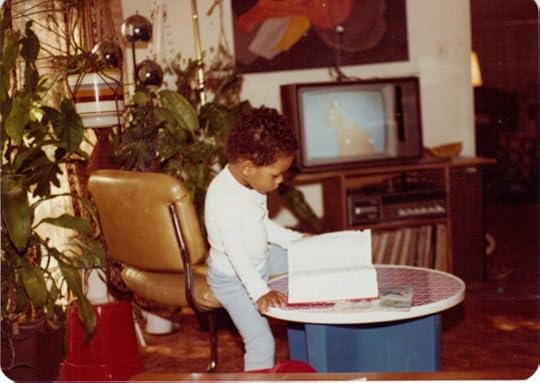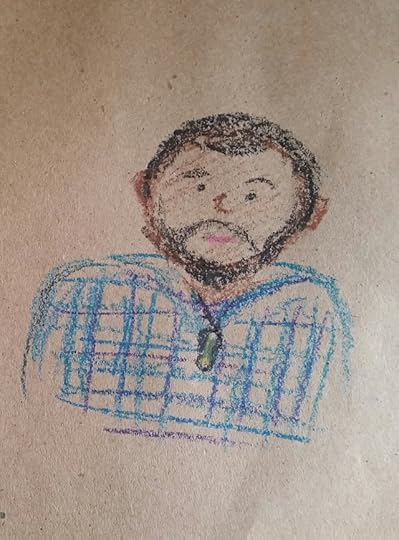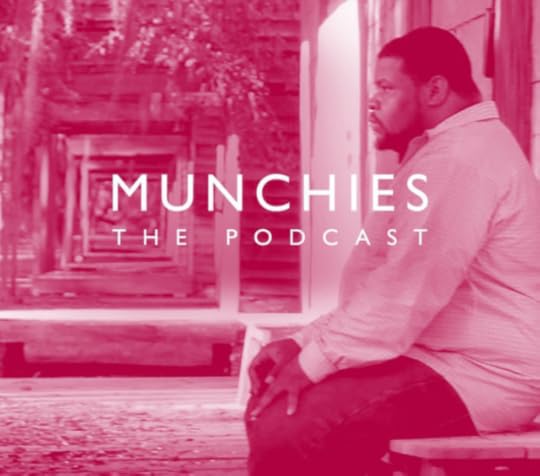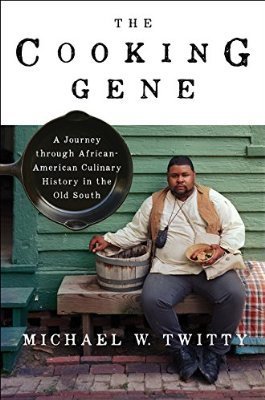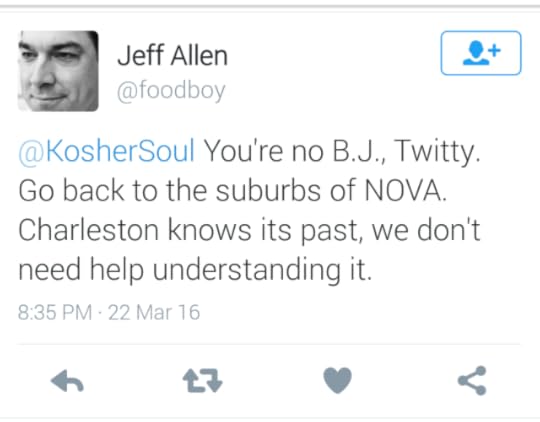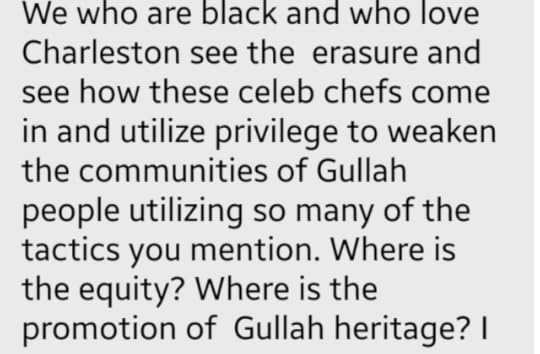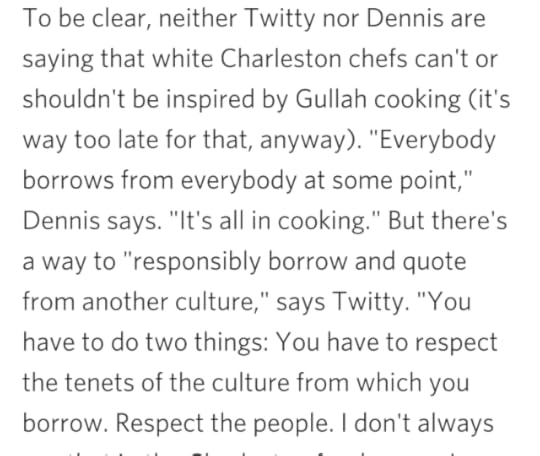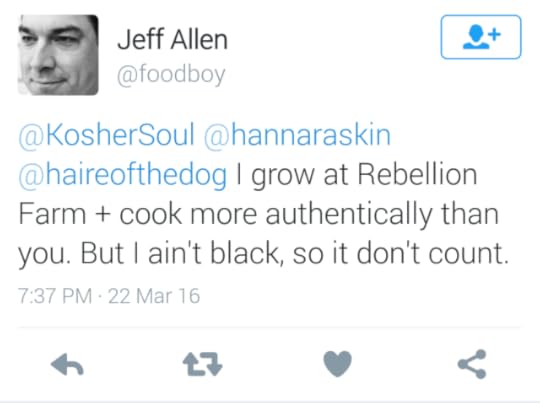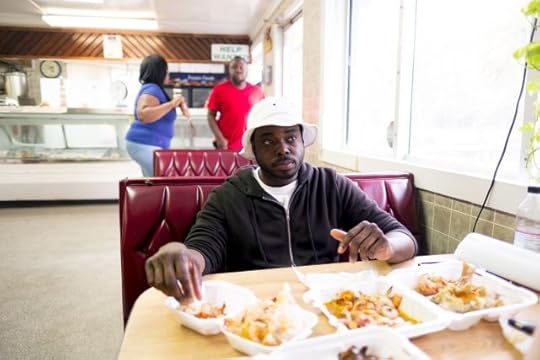Michael W. Twitty's Blog, page 12
July 4, 2016
My Appearance on PBS Newshour
Many thanks to Mark Scialla and John Yang for making this happen. Since the announcement that Jack Daniels’ owes it’s recipe to Neelus Green, the conversation over culinary appropriation and recognizing the creative capital of the enslaved has come back to life. Here is a link to the short interview with John Yang as well as a transcript which I have copied and pasted here for you as well. I appreciate PBS and PBS Newshour for hosting me and giving voice to the important story of early African American distillers, cooks, chefs, bartenders and caterers.
Why you can’t talk about the Southern kitchen without slaves’ contributions
The recipe for the bestselling brand of American whiskey wasn’t simply the invention of its founder — it was greatly influenced by a slave who worked for the distiller. That public acknowledgment by Jack Daniel’s helps raise broader questions about America’s culinary heritage and the under-appreciated contributions of African-Americans. John Yang talks to culinary historian Michael Twitty.
JOHN YANG: Grilling outdoors and drinking cold refreshments aren’t mentioned anywhere in the Declaration of Independence, but they’re both a big part of how we celebrate the Fourth of July.
This next segment was inspired by some recent revelations about the bestselling brand of American whiskey. Last week, The New York Times reported that Jack Daniel’s founder actually learned a lot about making whiskey from a slave who worked for the same distiller.
While that’s been known before, it hasn’t been widely advertised. Now the company is starting to acknowledge their complicated history on its distillery tours in Tennessee. That has some people asking questions about the heritage of American whiskey and about other culinary matters in the South.
Michael Twitty is a culinary historian. I sat down with him to get his perspective.
Michael Twitty, welcome.
MICHAEL TWITTY, Culinary Historian: Hi.
JOHN YANG: How common was this? Jack Daniel’s knew for a long time about the role of this slave named Nearis Green in the development of the company, but they just never talked about it. How common was that in the development of food and drink across the South?
MICHAEL TWITTY: Enslaved people were involved in every single aspect of Southern life.
Even when someone didn’t — quote — “own enslaved people” or own slaves — we prefer to say enslaved people or enslaved person — enslaved folks were doing the work.
And it’s very interesting, because you read these journals and writings of Southern planters, and it’s as if their hands are in the dirt, it’s as if their fingers are on the bricks, it’s as if their hands are in the kitchen and their hands are on the shovels. But they are not.
And so enslaved people are often hired out to work for other people. Distillers were experts. They were skilled workers. So, that is another form of income.
So, if you are only making so much of a cash crop, a lot of your money is going to come from in the hills and the piedmont from making alcohol, which is substantial. So, that enslaved person would have been very valuable and very necessary to an operation of that sort.
JOHN YANG: But they weren’t just providing the labor.
MICHAEL TWITTY: No.
JOHN YANG: They were helping develop and create the craft of what they were doing.
MICHAEL TWITTY: Oftentimes, they were the brains.
And, unfortunately, because enslaved people were considered three-fifths of a person, they aren’t being given credit for their intellectual capital. So, when an enslaved person invents something or innovate something, they improve something, that credit is being given to the slave holder, not to the enslaved.
And that this does over time is, it sets up for a really bad paradigm, where we think, these poor people, they were just the machines, they were just set to do a task. And the reality is, no, these were innovative, entrepreneurial, intelligent people.
You don’t set — you don’t bring a bunch of idiots to your country to build it. You bring geniuses. And a lot of times, that is what was going on. They were expert horticulturists. They were expert blacksmiths. They were expert distillers.
But the unfortunate part is, we know there were more people like Mr. Green, but will we ever know their names or their stories or what they could have been had they been free men and women?
JOHN YANG: And the influence is more than just liquor and distilling and fermenting alcohol.
MICHAEL TWITTY: Yes.
JOHN YANG: It is was through what we now think of as Southern cooking, right?
MICHAEL TWITTY: Oh, absolutely.
And I was just part of an ongoing debate, which will never end, over the ownership of Southern cooking. And the best way to put it is, is that this is a co-created world. It’s a co-created world between Africans, Europeans and Native Americans and others who are making up Southern-ness and American-ness as they go.
But I would like to always quote art historian Robert Farris Thompson, who says, until you know how African you are, you don’t know how American you are.
So, all of these pieces are woven in together. And you can’t possibly talk about the Southern kitchen without talking about peanuts or sesame or okra or watermelon or deep frying or barbecue or other forms of cooking techniques and spicing and ways of looking at food that are uniquely part of the African diaspora.
JOHN YANG: What do you think of Jack Daniel’s distillery now acknowledging the role that this man played in the development of the company and of the product?
MICHAEL TWITTY: Well, I think it’s pretty critical.
I think that we are at a point where the pushback — and I have led some of that pushback — talking about cultural appropriation, talking about giving credit where credit is due — sometimes, I recoil, because I feel, oh, I don’t know if I’m doing the right thing.
But when I hear news like this, I know I am. And other people who are like me are rewriting the history of American food and drink, not just because we want to talk about the past, but we have brilliant black mixologists, brilliant black bartenders in the now whose legacy we can not only celebrate, but preserve, so people know that Mr. Green didn’t die in vain.
JOHN YANG: Michael Twitty, thanks for being with us/
MICHAEL TWITTY: Thank you very much.
To learn more:
http://www.common-place-archives.org/vol-11/no-03/twitty/
Ole Missus vs. Mammy: Who Owns Southern Food?
How a Chef Is Exposing the Hidden Racism in ‘Southern’ Kitchens
Kosher Soul Food Brings Together African-American and Jewish Cuisine
June 30, 2016
Ole Missus vs. Mammy?: Who Owns Southern Food?
https://munchies.vice.com/en/articles/ole-missus-vs-mammy-who-owns-southern-food
I want to thank my editor at VICE Media’s food focused Munchies site, Matt Zuras and editor-in-chief Helen Hollyman for their incredible faith in my ability to take on a response to the piece “Edna Lewis and the Mythology Behind Southern Food.” by Cynthia Bertelsen. Cynthia and I have known each other since I got my start many years ago, but the essay she most recently penned was difficult. It’s thesis was directly aimed at the heart of culinary justice. Ownership as I explain in the VICE piece is not about putting up racial barriers, it’s about assuming responsibility and being proactive about passing on our heritage as a heritage. The Bertelsen essay seems to sound a clarion call for a type of reverse culinary racism that is a myth in the minds of the aware.
This question of Southern food and its origins is powerful. It says a lot about who we are and how we view ourselves. It’s also a billion dollar industry, much of it out of reach for Southern black people. I poured my heart into this piece and hope you appreciate the nuances I had to dance around–academic vs. Popular food writing. The past keeps haunting us because we have not truly confronted it.
Consider me a ghost hunter.
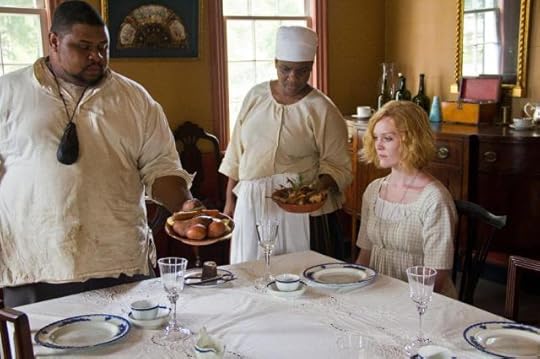
Photo by Jacob W. Dillow
If you feel as though you’ve learned a lot from the posts please consider supporting my work through PayPal. My readers were successful in raising $$ on Twitter last month and that enabled me to get a new pot, new redware and other essential cooking equipment to use in the field. If you learned something today and are moved to #gimmeahigh5$ please do so, I am Koshersoul@gmail.com on PayPal (you can use that pretty golden button here on the blog to get there) In advance, I thank you. This essay represents what indendent scholars can do they have want your support. 5 bucks..give up that expensive coffee one morning and you have done your part.
Thank you!


June 27, 2016
Kosher/Soul Mac and Cheese Kugel
http://theweiserkitchen.com/recipe/koshersouls-mac-cheese-noodle-kugel/
Recipe is in the above link.
I love macaroni and cheese and I love kugel. This original recipe of mine, presented on Tami Weiser’s Weiser Kitchen blog, shows you how to fuse both soul and Ashkenazi Jewish cooking together to make a dish full of flavor and history. I really hope you enjoy it and make it to go with your favorite summer treats. It’s the best of both worlds and makes a spectacular side dish for a potluck or holiday meal. Essen mit simcha!
As an African American who happens to be Jewish, or a Jew who happens to be African American, I am obligated to love two things—macaroni and cheese and kugel. They are basically the same idea–only they aren’t. Kugel seemed to me a weird sweet cinnamony macaroni and cheese—without the right cheese and because kashrut demands a separation of dairy and meat, I had to get used to eating macaroni and cheese as an entree or appetizer rather than as a side dish since it’s traditionally eaten with a number of meat dishes in buffet form. But, when in the shtetl–eat as the Jews do–so I learned how to love it. I make traditional kugels with cream cheese and sugar and raisins and the like and I make Southern kugels with peaches and crumble toppings and different types of spices.
Macaroni and cheese had several introductions into American life, but the most important was by way of James Hemings, an enslaved chef held by Thomas Jefferson. You’ve probably heard that Thomas Jefferson introduced macaroni and cheese–he kinda did, he certainly imported a macaroni making machine to aid the preparation of the dish when he got back to his mountaintop home at Monticello. However it was James who learned the recipe and “hooked it up.” Macaroni and cheese and kugel are essentially descended from a late Medieval era pasta like dish that emerged in Italy and spread into France and England. Jefferson’s Black cooks’ success was not so much in replicating French cuisine-which they could certainly do–but they added touches and flourishes of the South and African American foodways such as they knew. Over time, “macaroni pie” as it was called, and is still called in the Caribbean became a popular celebration dish among African Americans and for many became a soul food staple.
So here’s my challenge–how do I enjoy a koshersoul macaroni and cheese that’s also a kugel—here’s my answer–after much experimentation.
Photo by Tami G. Weiser.


June 17, 2016
Writing About Food at the Intersection of Gayness, Blackness & Faith
http://food52.com/blog/17071-writing-about-food-at-the-intersection-of-gayness-blackness-faith
Enjoy this piece I did for Food52 about being a Black, gay, living history interpreter of historical Southern food. Enjoy.
It’s an honor to speak to my fellow human beings about being human.


June 15, 2016
I’m Gay and This Is Why You Should Care
I don’t write often on here about my sexual orientation because this blog focuses on my journeys through African American food history. I came out when I was 16 years old in my school newspaper, and I was scared but I was ready to stand up for being who I was.
Wow…I’ve been out for 23 years….
Over the years I waxed and waned in how open I was about my orientation because frankly there were people around whom it wasn’t particularly safe to be honest about who I was. But this is a moment where the word irrevocable is in order. I will never do that dance again to accommodate the weak sensibilities based on prejudice. Prejudice it has been said, is nothing more than an emotional commitment to ignorance. If you know anything about my work, I can’t countenance that. For the most part I have spent the past few years as an openly gay food writer, historical interpreter and activist–but now let’s make it official–I’m gay and that’s not going to change–and its a part of not merely my erotic or romantic sensibilities but also what I believe makes my soul’s recipe unique and powerful.
This isn’t about Michael Twitty, but I can only speak to you from my gut as a Black, Gay, Jewish man who loves his people. We have over 100 people dead or wounded because of one man’s (nation’s?) inner conflict–over his sexuality, over cultural identity, nationalism and masculinity–problems he (we) resolved (resolve) with a dangerous semi-automatic weapon that shouldn’t be on the streets. We are reeling–we are living in a world that is being ripped apart at the seams by baseless hatred and the human cost–in the lives of elementary school children, club goers, movie attendees and everyday people is real. We have thought it a luxury to study how we got here (knowing our history, being culturally literate and aware) –but in the meanwhile–the ancient prejudices, hatred and misunderstandings passed down through centuries of blood vengeance and angst have come to roost in a very 21st century way. We are not only an audience to tragedy but we are participants in a ritual of horror, disgust, shame followed by cycles of numbness, amnesia and nostalgia for pain. It is our special insanity that only technology and nihilism in a bitter marriage can produce.
The people who were murdered and injured were not as some demonic pseudo-pastors have suggested—“pedophiles,” and any suggestion from someone that human beings are trash to be taken out removes all doubt that the individual speaking is not only no longer themselves human, but has forsaken the gift of being made in the image of G-d. Among the dead were mothers who supported their sons, young men committed to the loves of their lives, women who loved women, transgendered people who were standing tall, productive members of society, straight friends and allies, bartenders, bouncers, people who sought the love and humor and light of their community space to sustain em through life’s troubles and the stress of another week. They were human. They were American. Many were Puerto Rican in heritage or Black American and Lord knows we cousins….have faced our trials… Those who did not fall face a lifetime of post-traumatic stress and depression, physical healing therapy, permanent mental and physical damage and the cyclical mourning of lost friends and family.
Before I say another word—I want to ask peace and healing upon the living and wish peace on those who were murdered:
–Stanley Almodovar III, Amanda Alvear, Oscar Aracena-Montero, Rodolfo Ayala-Ayala, Antonio Davon Brown, Darryl Roman Burt II, Angel L. Candelario-Padro, Juan Chavez Martinez, Luis Daniel Conde, Cory James Connell, Tevin Eugene Crosby, Deonka Diedra Drayton, Simon Adrian Carrillo Fernandez, Leroy Valentin Fernandez, Mercedez Marisol Flores, Peter O. Gonzalez-Cruz, Juan Ramon Guerrero, Paul Terrel Henry, Frank Hernandez, Miguel Angel Honorato, Javier Jorge-Reyes, Jason Benjamin Josephat, Eddie Jamoldroy Justice, Anthony Laureano Disla, Christopher “Drew” Andrew Leinonen, Alejandro Barrios Martinez, Brenda Lee Marquez McCool, Gilberto Ramon Silva Menendez, KJ Morris, Akyra Money Murray, Luis Omar Ocasio-Capo, Geraldo A. Ortiz-Jimenez, Eric Ivan Ortiz-Rivera, Joel Rayon Paniagua, Jean Carlos Mendez Perez, Enrique L. Rios, Jean C. Nives Rodriguez, Xavier Emmanuel Serrano Rosado, Christopher Joseph Sanfeliz, Yilmary Rodriguez-Solivan, Edward Sotomayor Jr. Shane Evan Tomlinson, Martin Benitez Torres, Jonathan Antonio Camuy Vega, Juan P. Rivera Velazquez, Luis S. Vielma, Franky Jimmy DeJesus Velazquez, Luis Daniel Lestat Wilson-Leon, Jerald “Jerry” Arthur Wright.
May your names be etched forever upon our hearts with those of all who have been martyred for simply being themselves. We wish only peace and love and light on all those you have left behind, and we ask of us that we would be responsible for our brothers and sisters to come that such a thing will never happen again. We will do this not through merely words of faith but by action, activism, taking a stand and being courageous–our dedication to permanent positive change will be our prayer.
Lo’ ta’amod al dam reyecha! THOU SHALL NOT STAND IDLY BY THE BLOOD OF YOUR NEIGHBOR!
I will confess that nearly 400 years of lynchings, assassinations, targeted murders, domestic terrorism and the oppression of my people prepared me for this. That’s not bragging–that’s horrific–but it is my circumstance of birth. 300 here, 200 there…Fort Pillow, Rosewood, Charleston, Tulsa, Washington, Baltimore, St. Louis… I want you to understand I had a grandmother who remembered seeing the body parts of lynching victims displayed in store windows in Alabama as a grotesque and gruesome reminder to “keep the niggers down.” I had a great-grandfather who was jailed and almost lynched for being a Black man in a soldier’s suit in a town where a white woman had accused “a Negro” of being her assailant. I am the product of the children of multiple rapes against Black women by slaveholders and overseers. We were denied equal access to education, opportunity and the right to the wealth this country was built on. I was prepared for this moment by being a son of the African Diaspora, cast into the Atlantic world by circumstances beyond his control and beyond the control of those who came before me. Our story is not just our wounds but our armor–our resistance (in the words of William D. Piersen) too civilized to notice–of problems stated in terms of music and solved in dance–of thundering speeches of moral suasion, triumph despite adversity–strong women making strong daughters, strong sons with a charge to keep—of an enslaved people who turned the tables on their enslavers and with wit, humor and courage–enslaved the cultures that enslaved them with the breath and verve of ancient, enduring Africa–how she loved, how she prayed, how she danced, sang, spun words, walked, talked, felt and cooked.
I am by blood and by choice of a son of Israel. I cast my lot with a people who have wandered the earth driven by a will to survive the hatred against us for placing our faith in a singular, individual G-dhead. We were told we were destined for extermination not long after we were born, and many tried and often did exact terrible and bloody attacks–and still do–against us—none so awful as the Shoah–when nearly 6 million of us died, many of us affirming the oneness of our G-d and the oneness of our people. We are a long list of men and women, few in number with an impact as incalculable as the stars. Moses and Jonas, Jesus and Mel, Bella and Gilda and Golda and Julius and Angela and Juan and Ofra and Asenath Barzani and The Maid of Lublin…. We persevere–we place ourselves in the shoes of our Ancestors and reenact their footsteps across the globe in search of the days when Isaiah’s prophecies will come true and humanity with live in ethical and moral balance with the basic principle that we are indeed betzelem Elokim–made in the image of the Lord.
I am gay, I am a homosexual, I am a same-gender loving queer cisgendered nearly perfect Kinsey-6. I come from people burned at the stake, I come from people who were stoned, I come from men and women who were forced into loveless marriages, I come from hidden loves and love that dares not speak its name. I come from Michelangelo and DaVinci and James Baldwin and Bayard Rustin and Alexander the Great. Bessie Smith and Audre Lorde and Joan of Arc and Sappho and Lily Tomlin. I come from Rabbis who secretly wrote poems about how they wish they were born women and blues men who sang about having “sissy man” blues and berdaches, drag kings and drag queens. I am the burned out nightclub in New Orleans that left 43 dead, I am the Oscar Wilde going to jail and special ordering gay books by phone as a teenager, picnics at Roosevelt Island, kisses at the rain at the National Zoo, holding hands at an art museum, making dinner for his family, I am dancing at the gay club–and voguing–and walking runway and attempted death drops and blowing a whistle at 20, VIP at 25, dancing until I almost died at 39, making a happy fool out of myself at Pride.
Many wear the moniker of oppressed, of marginalized and downtrodden. We are not our scars, we are not our wounds, we are not bruises and broken parts–we are the healing after these, the strength assumed after centuries of defeat—the marches that paid off, the dream of praying without pogrom, kicking our legs up and scaring the hell out of the NYPD in 1969—that’s our culture–that’s our identity–that’s who we really are–we are getting back up one more time.
Do you feel better now, do you feel magnanimous and heroic, do you feel stronger and proud? Well I’m about to make you feel like shit, not because I’m a jerk–but because I have to.
Intersectionality is not just some buzz word that came from the trickle down from a liberal college’s syllabus…it is my life. I live this word everyday. You probably do to…
It is a reality many of us live–including the negative one responsible for this tragedy–may his name be erased. Our ability to navigate and negotiate the fine lines created by our bordercrossing is what keeps us sane or causes us to lose all sense of truth.
I have been on this planet about 40 years. I am green–and in the long stretch of cells, rocks, patches of sky and tree rings–young, an infant, insignificant.
I was born 8 years after Stonewall. I was born 5 years after the New Orleans club arson attack. I was a kid when AIDS first reared its head. I have seen and touched the quilt on the national Mall–I have marched with people who didn’t know me—I remember the big march in 2000–I was at the national vigil for Matthew Shepard–I remember both Don’t Ask Don’t Tell and its repeal. I was there when that bastard child DOMA was born. In the shadow of the Charleston church attack I remember the day marriage equality was finally achieved. I hugged Margaret Cho in a DC dance club, saw Willie Ninja work a ballroom floor, and stuck dollar bills into the jockstraps of many of my favorite——well–“actors…”
And yet–
I know we can vote, I know we can fight for gun control laws, I know we can advocate that anti-discrimination laws be codified and that parental equality and bathrooms be resolved. We can shout from the rooftops we are mad, angry, heartbroken and sad. We are reeling and hurt and feel as though we personally have been affected. But then there’s tomorrow and the day after that….and we are right back to…..
NO BLACKS ITS JUST A PREFERENCE DUDE. SORRY, GOOD LUCK….
GAYS ARE JUST WHITE MEN TRYING TO GET OVER ON US.
ITS GETTING TOO DARK IN HERE–TOO MANY BLACK GUYS IN THIS CLUB>.
HOMOSEXUALITY IS FORBIDDEN BY THE TORAH IN FACT A HOMOSEXUAL IS LIKE AN ORANGE ON A SEDER PLATE…
NO ASIANS, NO FATS, NO FEMMES.
AIDS IS NOT A BLACK PROBLEM.
THESE PEOPLE ARE IMMORAL AND THEY ARE TRYING TO TAKE OUR CHILDREN, NO JEW WAS EVER GAY.
CAN I SEE TWO FORMS OF ID BEFORE I LET YOU IN OUR LILY WHITE GAY CLUB?
LETS MAKE A STONEWALL MOVIE THAT DOESN’T REFLECT AT ALL THE ETHNIC DIVERSITY AND GENDER SPECTRUM THAT WAS ACTUALLY AT STONEWALL…
GAYNESS IS A WHITE SICKNESS SENT TO DESTROY BLACK MEN AND TURN OUR WOMEN INTO MEN.
NO WOMEN.
IN AFRICA THEY DIDN”T TOLERATE HOMOSEXUALS, LESBIANS AND FAGGOTS–THEY WERE PUT TO DEATH.
MASC FOR MASC ONLY, QUEENY GUYS AND LEATHER GUYS ARE AN EMBARASSMENT–WHY CAN”T WE JUST BE NORMAL AND STRAIGHT ACTING AND APPEARING?
WHY SHOULD I CARE ABOUT BLACKS–THEY ARE ALL HOMOPHOBIC ANYWAY…THEY DON’T SUPPORT US AND THEY ARE BACKWARDS ANYWAYS…
THE JEWS ARE JUST WHITE PEOPLE CLAIMING TO BE HEBREWS.
YOU’RE NOT REALLY JEWISH–YOU”RE JUST A CONVERT.
JEWS-AND THEIR BOOK OF JEWISH FAIRY TALES AND THEIR SILLY MADE UP GOD AND ABUSIVE PRACTICE OF CIRCUMCISION IS THE REASON WHY. ..
I LOVE BLACK WOMEN BECAUSE THEY ARE SASSY AND FUN AND COOL BUT BLACK MEN ARE DIRTY AND THEY HAVE AIDS AND THEY STEAL YOUR STUFF…
I LOVE GAY HAIRDRESSERS AND CHOIR DIRECTORS, ITS A SHAME THEY ARE GOING TO HELL.
WHAT ARE YOU DOING TALKING TO THAT BLACK GUY–PEOPLE MIGHT THINK YOU LIKE “DARK MEAT….”
SOME OF OUR BLACK WOMEN HAD TO BE THE MAN OF THE HOUSE SO LONG THEY BECAME LESBIANS.
JEWS ARE JUST BLOODSUCKERS…
“SCHWARTZES” (YIDDISH FOR BLACK) ARE NICE WHEN THEY KNOW THEIR PLACE.
WHO CARES IF THEY HAVE TO MOVE OUT OF THIS NEIGBORHOOD?–WE MAKE IT BETTER.
HEY MICHAEL—“So are you actually Jewish? Why can’t you just be Black?”
HEY MICHAEL—“You’re the whitest Black guy I know….”
HEY MICHAEL—“You’re not really a bear–because you don’t have enough hair–and besides thats why I don’t find African American men as attractive…”
HEY MICHAEL—-“ARE YOU SURE YOU’RE GAY BECAUSE I DON’T THINK YOU’RE GAY ENOUGH…”
HEY MICHAEL—“You’re too smart to be that fat.”
HEY MICHAEL—“WHY DO YOU HAVE TO BE THE F_____ING ODDBALL OF THE FAMILY” (Signed Mom 1994)
HEY MICHAEL—“What do you want me to do to support you? Buy you a dress?” (Signed Dad 1995)
HEY MICHAEL–“PEOPLE JUST AREN’T GOING TO ACCEPT YOU–YOU’RE JUST NOT AN OFF THE SHELF TYPE JEW…”
HEY MICHAEL—“WHY ARE ARABS BEING BROUGHT IN TO TEACH OUR CHILDREN ABOUT ISLAM” (Concerned parent on my first day teaching in a Hebrew School high school program…note I am not Arab or Muslim…and neither are a negative.)
HEY MICHAEL—“You can’t be Black, gay and Jewish–America isn’t ready for you.”
HEY MICHAEL—–“WHY ARE YOU WITH THAT WHITE BOY?”
This is what also has to stop.
I come from three of the strongest peoples on earth–and I’ve heard variations on hate like you wouldn’t believe. And its not just us–its the whole planet. It’s the mood of our country–we honestly believe we have to hate to be whole, to stand up, to be counted.
Don’t just be angry at homophobia that kills–be mad at white supremacy that kills–about homophobia in the Black community that isolates and destroys families and corrupts houses of worship into houses of hate–honor Black ministers and civil rights leaders and promote their profile of those who work towards bridging the gap and bringing us all together. Be angry at racism in the gay community and stop telling me to get over it. Be angry at gay misogyny and universal transphobia and work against anti-Jewish attitudes and beliefs and the silencing of Jewish diversity–because Jewish people of color exist and we don’t have to get your validation–be furious at homophobia in the Jewish community and racism in the Jewish community, cut that nonsense out that says Black people belong in a box and can’t be anything we want–cut that nonsense out that says gay is or can only be one thing and everything else is useless–cut that nonsense out that posits over privileges only one kind of gay person of a certain class and color and look and appearance.
You can throw in gender and sex, Latinx, physical ability, economic class, creed, nationality, language, ethnicity, religion, absence of religion, politics–and people will find a way. STOP IT.
If you say love wins over all–then do it–mean it–live it. Stop the lip service. Stop being apolitical and apathetic, lazy–nope–stop making excuses for internalized hatred and outward expressions of chauvinism.
We have to pledge to work on ourselves–not just shouting down the neighbor whose voice we don’t like. We owe it to the many dead and the many wounded to be better to one another and to ourselves. If we are truly all Orlando then our shoulders must be willing to bear the serious burdens of complexity and the willingness to give up our emotional attachment to ignorance.
I don’t have all the answers–but when this news begins to fade–I want you to have a take-away that you’ll never forget–and never forget to act on. Love thy neigbor as thyself, and don’t forget to love thyself. How we have survived our oppression is our greatest form of cultural capital–and the greatest gift we have to tell each other.
I don’t want this tragedy to ever happen again, to anyone.
Ever.


June 7, 2016
Michael Twitty Addresses Racial Inequality in the Southern Kitchen | MUNCHIES
Helen Hollyman, Editor of Vice’s very popular Munchies site sat down with me to have a conversation about Southern food and cultural politics. I discuss dialoguing with Sean Brock, the Charleston food press and my forthcoming book, The Cooking Gene. I hope you enjoy!
Editorial:
Michael Twitty Addresses Racial Inequality in the Southern Kitchen
Episode Title:
#17 Michael Twitty – Addressing Racial Inequality in the Southern Kitchen
Episode Description:
On the latest episode, I sit down with culinary historian Michael Twitty to discuss his new book, The Cooking Gene, and his open letter to chef Sean Brock, which addresses current racial inequalities in the Charleston food scene.
iTunes page:
https://itunes.apple.com/us/podcast/munchies-the-podcast/id1040667321?mt=2
Soundcloud:


April 22, 2016
Happy Earth Day: The Culture of Collards on Vimeo
Enjoy this short film by my friend Aditi Desai featuring me, 3 Part Harmony Farm and City Blossoms DC in an exploration of the heritage of collards and culinary and food justice. I was privileged to see it screened at the DC Environmental Film Festival at American University, and in honor of Earth Day, you can see it tonight at my Alma mater Howard University!
Enjoy and happy Earth Day!


April 4, 2016
The State of Soul Food in America: Exploring the Past, Present, and Future | First We Feast
This was an amazing review of the contemporary soul food scene edited by Adrian Miller, author of the James Beard Award winning Soul Food: The Surprising Story of an American Cuisine. I was very happy to participate in yet another FirstWeFeast.Com piece and I think all of the responses are thoughtful, informative and come from a place of authority and genuine love for our tradition. Please enjoy and SHARE!!


March 23, 2016
Dear Sean, We Need to Talk
3000 plus words—turn back now or read until the end…grab coffee now.
I have to have a conversation with chef Sean Brock. Sean, I hope you’re reading this. Immediately. Things have gotten out of hand in the discourse on “race” and Southern food and it’s time we hashed things out. One to one, personally, and have a hummus summit. (warning: satirical Israel/Palestine peace process reference) It doesn’t matter who made the hummus first or who made it better, or whose hummus is more authentic; the point is we both make hummus, we both love hummus and we want people to appreciate what hummus means to us and we want people to keep making hummus, secure in the knowledge that hummus is a part of everyone’s story and that hummus will endure.
But we are not talking about hummus—we’re talking Southern food—and specifically we’re talking Lowcountry food and what Charleston brings to the table—we are talking power, access, and moving the conversation beyond triggers like “culinary appropriation,” into discussions of culinary justice, amplification, and social and political responsibility.
This is serious shite. We are long overdue for a summit Mr. Brock.
The past 24 hours have changed me. I can’t say for the better. Those who know me and my work know that I strive to choose a higher path—I am happy to be bound by Jewish law to look inside myself and weigh and judge my actions, thoughts and choices. G-d or no G-d, and maybe it doesn’t matter, I have a charge to keep and I find it difficult when the challenges to my identity, my work and my integrity force me to fight back and give retort. I should note with just a bit of irony the word for “war,” (milchama) and the word for “bread,” (lechem) in Hebrew share the same root (lchm). Bread—coded down to us from the days of old as both money and the basis sustenance—food—is often the place where conflicts begin and end.
This I will concede—and I may concede nothing else—you and your fellow chefs have the right to “do you,” however you please. You can cook whatever you want, call it whatever you want, stand tall in your convictions and communicate the message you want on your own terms and charge what you will for the experience. It is not my prerogative to circumscribe your potential or curtail your growth or trajectory. My advocacy was but a whisper once upon a time and I could be easily ignored but now it has gained traction and perhaps now you will incline your ear and listen to what I have to say—as an equal with my own place at the table—earned in cuttings of cane, burns, cuts, pounds of cotton and hands of tobacco and sowings of rice. I have stirred the pot, putting myself in the footsteps of those many of your leaders do acknowledge and do write about—even if I wonder to what end. The research, recreation and interpretation of enslaved people’s food is not personally or communally easy—and it goes beyond creativity and taste—it is in many ways a willed descent into hell. I assure you it is taxing, painful and revelatory—but I have no choice—as you have no choice but to be who I was created to be.
But like my spiritual Ancestor, Esther ha-Malkah, I come on this day, the 13th of the moon-time of Adar in the year 5776 to plead for myself and for my people. My people are the living and the dead—and unfortunately, the dying. In 2006 I touched the saltwater at Sullivan’s Island for the first time. It was my first engagement with the place that many have called “The Ellis Island of Black America.” I was corrected by Marquetta Goodwine, “Queen Quet,” to many that no—this was no Ellis Island. Despite the fact that roughly the same number of European immigrants had come through Ellis in relation to enslaved Africans who came through Sullivan’s—roughly 40ish percent…that’s abstractly 4 out of every African Americans who can trace an ancestor back to that one spot—these were enslaved people, not people looking for a better life.
It was at that moment, ten years ago I sank to my knees in the wet sand, fully clothed and guaranteeing my jeans would be stained—and humbled myself before my dead. At the time I did not know where they came from or who was there—I just knew this was where I had to start. You know Sullivan’s Island—its bordered by condominiums and would be nothing if the Revolutionary War and Civil War had not left their marks there. Even though this space is as important as any Charleston antebellum mansion—piazza and all—its not a million dollar space—its just a plaque and a bench lovingly donated by nobel prize winner Toni Morrison.
Unfortunately, and you can’t change this—and neither can I—this is how my America begins—not with opportunity—but with chains—and not just then—an aftermath—a legacy, a chronic illness carried in body, spirit, soul, and mind—systemic racism, racial class disparities, political disenfranchisement, violence and terrorism—both from state and rogue citizen. That’s my heritage—triumph and uplift tempered by this—chains linking me back to my father’s first father and my mother’s first mother—who stepped off the boat and went to the plague house at Sullivan’s only to await sale not very far from where Husk is today. I am proud to tell you I am an Akan many times over and I am a Mende—a son of rice growers through Sierra Leone leading backwards to the grandeur of Old Mali and beyond that to West African prehistory on the river Niger. I have no names for them—until I die I never will.
When I kneeled—I was told I had to work in the fields, I had to stir the pots, that it was not enough to sit in an armchair and pontificate or grow things as a hobby—these things—you well know—have been done—and often not well—and they don’t serve any of us to any real end. What I endured for their sake—at their command—compares not with five minutes in their lives—and I can honestly say—I would refuse five minutes in their hell. I have it easy. But the hard work taught me to respect those who do the hard work today—who struggle to keep our culture going, who stress and swear because there seems to be no hope in sight. This is for the ramen-eaters, for the food desert nomads, for the kids who cannot take my journey, for the parent who wants to teach our story and pass it on but doesn’t know how to start, where to begin or what to say. My burden is in some ways heavier than yours—and that’s not your fault, but if you care so deeply for this food and where it comes from—and I know you do, you will help me lift a corner of this burden. I know you already do some of this locally–I want to seek a way to do this on a larger scale.
My greatest sin in the Eater piece—as I was quoted by my mishpocheh Hillary Drixler—was calling the “scene,” out to begin to explore a self-directed path of culinary reparations—for a more open engagement with a Black community that is special, unique and proud. Yes stories of great Black historic chefs are being told, and menus are steeped in history and ingredients are telling stories about the people of the past and your menu supports Southern businesses and there are fledgling discussions on how to increase Black traffic in downtown restaurants and putting more Black cooks and culinarians out into the scene. These are the claims at least…I love David Shield’s dedication and sincerity—but even he admitted to me that my nudge and the nudges of others helped opened the minds of many to greater community engagement. And yet–Charleston has a long way to go before it is a center of culinary justice as well as the scene that you and others have obviously worked hard to put on the map. The frustrating thing is that it could be such a city.
When I last visited Charleston I went with Chef BJ Dennis to a food spot where the owner and her customers gave me an earful. She made it clear that Gullah based establishments were often passed up in favor of traditional white owned restaurants in Charleston and that the local African American community did not always do its part to look after its own. One gentlemen—and they ALL know BJ, made sure to tell him before he left, “Remember what I told you, we are not Lowcountry, WE ARE GULLAH.” Then came the refrain—“to the bone.” There are quiet and hidden currents of differing opinions that won’t be heard in mixed company. This is the way –as we both know–of the South.
The cure is to not lie or obfuscate. The cure is to bear witness, to be real, to be truthful. The way to change our fate is to change the names we give and take, to re-arrange our place, to change our deeds, to pray yes, but also to give back and to cry out. (I thank the Rabbis of antiquity for this formula.) My path is not one of quiet acceptance but of a heritage born of the ring shout, forged in blood, sweat and tears in the slave quarter. This is why I cook.
Your colleagues who critiqued the Eater piece thought my comments were personal—and they were not. I salute you for going to Senegal to learn more–but that’s your job. I was annoyed and confused when certain articles deemed you “the white chef version of Henry Louis Gates Jr.” (of Finding Your Roots fame). I disagree with some of your supporters when they assume that the spotlight put on your search for inspiration and ideas is on an “overgrown path”—when African, African American and Afro-Caribbean and Latino culinarians have been writing about these connections and celebrating them without you—and without any media coverage for quite some time. Pierre Thiam’s Yolele and my Fighting Old Nep pre-dated your trip to Senegal—but nobody lauded us for making the connection—nobody said we were exploring “unchartered territory,” nobody said we were going where nobody had ever thought to go. This trickles down—because people will then ask culinarians of color—“How is what you’re doing different from what Sean Brock is already doing?” See—I’m not pissed off at you because I don’t know if you sanction that or not—it’s just already we are being taxed out of the intellectual real estate that is our inheritance. Gentrification is as much creative and mental as it is physical. That article and the Food and Wine piece that followed it was confusing and problematic for a lot of Black culinarians—but we collectively kept our mouths shuts in the best tradition of wearing the mask.
Nobody hates you–nobody hates Andy or Rick–we just want equal opportunity of agency. There is no reason to assume otherwise.
I do not know why you chose not to introduce me at MAD at the last moment or why I have seen you multiple times since and yet you have not spoken to me. I have eaten your food—and your Mother’s food–supported your restaurant in Nashville, I even reached out to you in 2012 when I was a nothing—a nobody—looking to dialogue with you about a little project I was doing called The Cooking Gene. I never heard back after an initial email exchange brokered by a mutual friend. I saw you make jokes on social media—but I desperately wanted to sit down with Sean Brock—to see if you were my blood, my cousin, my kinsman. I have tried to reach out, and my intentions are to squash these feelings of mistrust I am trying to shake.
I still do feel the need to reach out but the reaction to my quotes in Hillary Drixler’s Eater piece was swift and harsh—the tone was one of putting me in my place. Despite the fact that Matt Hartman of Durham wrote a very clear, eloquent argument making many of the same points I did—I was singled out for much harsher and direct criticism than was Matt. The wagons were circled. People who I thought knew me well enough to pick up the phone or email me were insinuating that I was nothing short of a culinary carpetbagger a stranger, a fool sent to spread divisive misinformation about a model food scene above the fray of other issues in the world of Southern food—of acknowledging the African presence and agency. I was called out on Twitter—not as Michael Twitty, our colleague—our fellow Southern striver and historian–a man in search of his roots and those of his people and all Southerners–but as @koshersoul the stranger—the disrespectful “comeya”—an invasive voice alongside the soothing peacemaker Chef BJ Dennis. Not cool.
Backs have been turned to me and ears have been closed. Chris Haire said he had no interest in reading Matt Harman’s piece. Where is the reciprocity? Why should one side listen if the other does not? I said “I will not speculate on why Matt Harman has not receved the critique I have.” I didn’t want to even be on record as assuming anything—race—class-sexual orientation—where I live—etc. Chris shot back that I was injecting race. There is it—the new way to diminish our messages—“race baiting,” being “divisive.” We’re tired of this—really tired. B’rer Fox set a good example though didn’t he? Put the tar doll up people will punch before they think. He currently believes I just “half talk out of your ass.” (his words) Oh well. Not everybody has to like you. I’m not in this to avoid critique, but I won’t be called out of my name.
Hanna Raskin and Kinsey Gidick explained what they felt the article’s shortcomings were via the article’s comments section—but in my opinion, they resorted to classic defense mechanisms—progress is slow but its coming…but what’s worse:
(How do you respond to that?)
Then comes the call out—“The interpretation offered up by Michael Twitty is applicable to many places; its possibly even applicable to the Charleston Wine + Food Festival, which Hillary attended. But if she had interviewed a few more Charlestonians who identify as Gullah, she would have discovered that the racial issues plaguing Charleston aren’t rooted in culinary appropriation. The real concern is not giving credit to African American for rice and okra: That’s well underway in better dining rooms. It’s giving them jobs (and critically, promotions.) It’s giving them a warm welcome to restaurants that re now patronized almost exclusively by white people.”
And yet I got this message the same day from one of many Black Charlestonians who reached out:
Anyone who has heard me speak or read my writings knows that’s a straw man if you ever heard of one…Michael Twitty is apparently not interested cooperative economics, diversifying the kitchen, improving opportunities for more brick and mortar Black restaurants and education within his own community—he’s just whining about a boutique rice originally revived to feed ducks—and later re-booted as food for elite humans-just like a 150 years ago. Its not just the ingredients–its stories, messages, marketing–but …Oy, zenug ist zenug.
If I was that simple and boring—I wouldn’t be where I am and all of you know that. Hanna, do not our sages teach to judge the whole of the human favorably (machrio l’chaf zechut)?
Tweets were exchanged—condescension mixed with a flurry of stereotypes—I’m apparently ill-informed, incapable of making and following a logical argument, and at worst a social-media aggressive. It’s not fair to my character, because some of these same people saw me take my time to talk to students in Charleston in a school for behaviorally challenged youth…these are people who have eaten my cooking and watched me sweat on a plantation under a hot sun. These are people who know I have seed collections and have consulted for the best of the best—people who have heard me give the exact same messages at MAD in Copenhagen, in London at the Barbican Theater, at Oxford University and on the stage of TED in Vancouver. It was not that my message had changed, it was that my platform was now here—not there—and that I was not indicting the “scene,” for erasure of the Black presence in the past—it was not sharing the benefits of the now and this is the crux of the Hartman article–and my advocacy.
Any of these people—or the whole lot of them could have called me—emailed me—asked to speak privately or put out something that might correct what they saw as an imbalance—but they chose to attempt to muddle my message, marginalize me, and malign by character and intent. Did they feel I did this to their Charleston? No clear answers on that–and no personal outreach. They are still going as I write this. This is extremely disheartening and discouraging. This is not what we need in the current political climate. One tweet from Jeff Allen said “I cook more authentically than you. But I ain’t black, so it don’t count.” Ok so I never said you had to be black to make this food–but if people want to play that old game–they can. The Eater article is clear–I never said that–it explicitly says I don’t harbor that sentiment.
Is this the best we can do in dialogue about what food and identity and meaning are really all about?
Hanna Raskin ‘ s response was “those aren’t the words I would have chosen…” which begs the question, what words were more suitable?
Sean, we, the descendants of these Africans are dying. We are dying of stress and chronic health ailments rooted in diet and quality of food and access. We are in need of economic opportunity and food is such an important gateway for that. We are dying of police bullets and terrorist bullet and many don’t really give a fuck. We are joining our Ancestors faster than we should and as our Rome burns other people’s Rome rises. This is why I’m hot. This is why I cook. This is why I insist on my right of return as the descendant of Charleston’s enslaved and of the rice growers that gave the Lowcountry a story to sell. The South shall rise again, but will we? We need economic development, food justice—and most of all we refuse to be put at the periphery of our narrative when we should remain at its center. I know that you know this is what I’m fighting for sure as BJ and many others have for years.
This isn’t technically your responsibility, but if part of our story is in your hands, so too must be part of a solution.
Sean—if you want to cook sometime let’s do it. If you want to talk sometime let’s do it. We will not agree on everything—nor should we. I have hard questions for you. You have hard questions for me. We are both sincere. But this I know—we are here at this moment on this planet, sharing this heritage for a reason—and we must not waste the opportunity.
Your friend in skillet—your cousin in mind—The Antebellum Chef, Michael W. Twitty, grandson of a great living South Carolinian—Gonze Lee Twitty, founding member, Federation of Southern Cooperatives.


March 22, 2016
How Gullah Cuisine Has Transformed Charleston Dining – Eater
http://www.eater.com/2016/3/22/11264104/gullah-food-charleston
Please enjoy this incredibly well written piece by Hillary Dixler synthesizing so many elements of the stories, struggles and triumphs of the Gullah-Geechee presence in the culinary scene of Charleston and beyond. Me and my good friend master Gullah Chef BJ Dennis get a lot of coverage in this piece, but more importantly it’s fair and it’s accurate in expressing the messages we want to come across to a wider audience. I’m so thankful for this piece.
Don’t forget to pre-order The Cooking Gene! : http://www.amazon.com/The-Cooking-Gene-African-American-Culinary/dp/0062379291


Michael W. Twitty's Blog
- Michael W. Twitty's profile
- 322 followers






